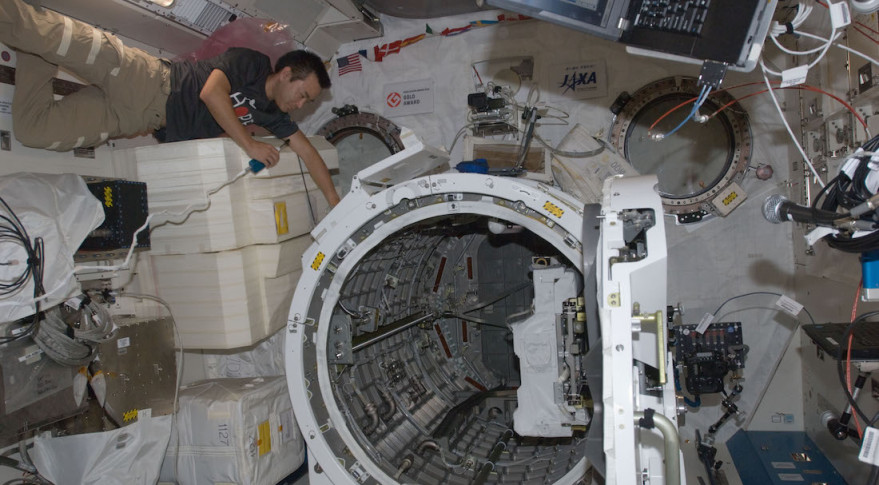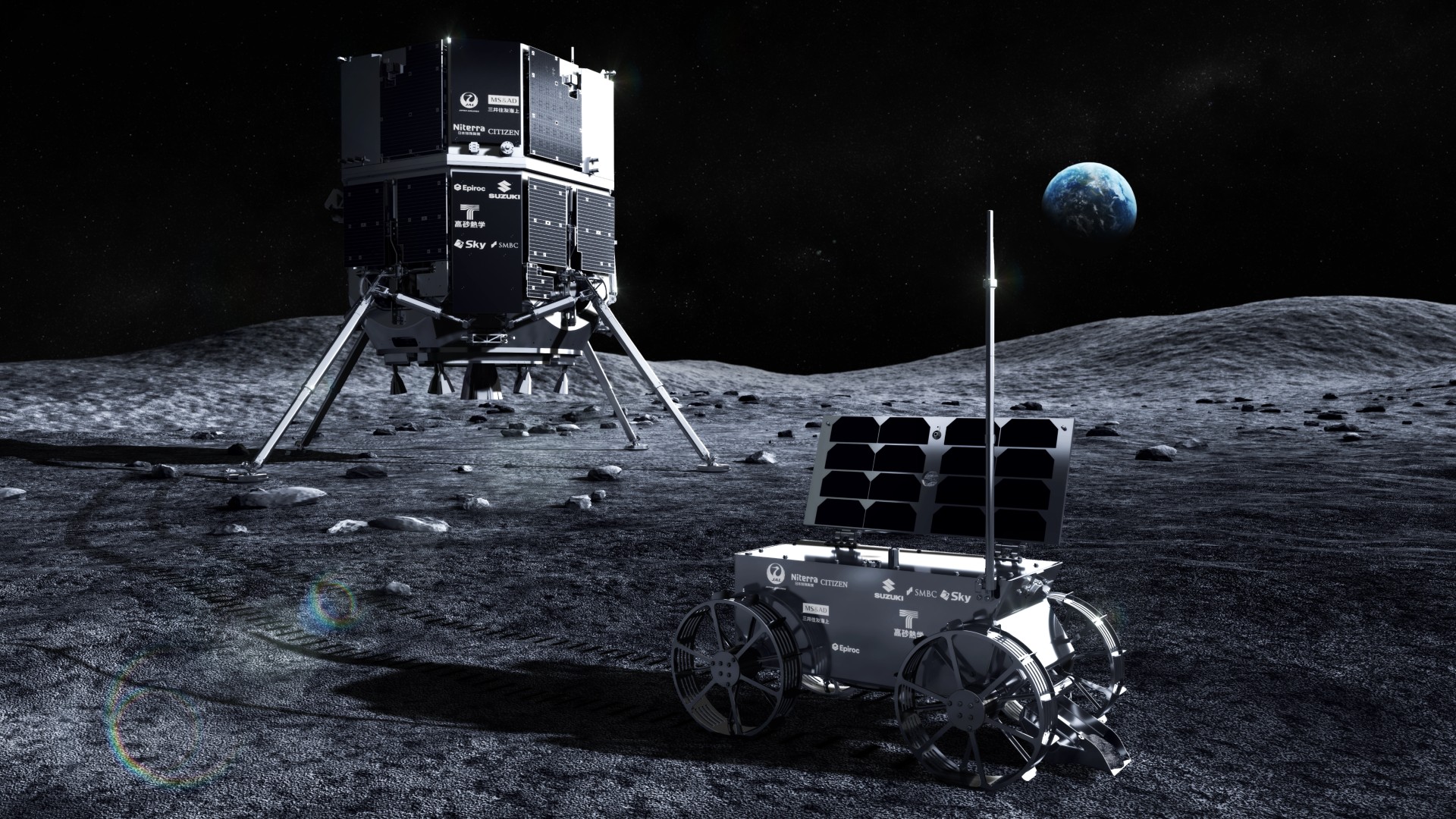NanoRacks Presses Ahead with Private Airlock

The proposed airlock, estimated to cost $12 million to $15 million, would attach to the station's Node 3 module and provide an additional means to deploy small satellites from the station.
Satellites today are deployed through an airlock on the Kibo module, but access to that airlock is limited, creating a bottleneck for customers.
Pending NASA approval and private funding, the airlock could be installed on the station as soon as 2018. [Ars Technica]
More News
An Ariane 5 successfully launched a next-generation communications satellite for Intelsat Wednesday night. The Ariane 5 lifted off from Kourou, French Guiana, at 6:20 p.m. Eastern time and placed the Boeing-built Intelsat 29e satellite into orbit. Intelsat 29e, the first of Intelsat's "Epic" series of high-throughput satellites, will provide broadband communications for the Americas and Europe. In a departure from typical Ariane 5 missions, this launch did not feature a co-passenger satellite because of Intelsat's desire to launch this spacecraft as soon as possible. The launch was the first of seven to eight Ariane 5 missions this year. [SpaceNews]
The U.S. Air Force is studying the early termination of an $800 million annual subsidy it gives to United Launch Alliance. Air Force Secretary Deborah Lee James said at a Senate Armed Service Committee hearing Wednesday she had directed her staff to study the ramifications of ending the service's launch capability contract with ULA before it expires in 2019. That contract, which covers services not covered under any specific launch, came under criticism by senators including committee chairman John McCain, who called it "$800 million to do nothing" after ULA sat out a competition last fall for a GPS 3 satellite launch. McCain also confirmed the hearing plans to introduce legislation that would reinstate a ban on the use of the RD-180 for future national security launches. [SpaceNews]
DigitalGlobe has booked $200 million in contracts for high-resolution images from current and future spacecraft. The contracts, which the company announced Wednesday, cover imagery as sharp as 30 centimeters from the WorldView-3 satellite launched in 2014 and the WorldView-4 spacecraft scheduled for launch this September. DigitalGlobe said it also has $135 million in letters of intent from non-U.S. defense and intelligence customers. [SpaceNews]
Get the Space.com Newsletter
Breaking space news, the latest updates on rocket launches, skywatching events and more!
Lockheed Martin is confident its work on Orion will remain on schedule to support a launch in late 2018. The company, NASA's prime contractor for the spacecraft, said it is making the progress it needs to keep to that schedule, despite concerns raised in a recent report by an independent safety group on issues such as the spacecraft's heat shield and European-developed service module. NASA and Lockheed held a ceremony Tuesday in New Orleans to mark the completion of the pressure vessel of the spacecraft, which will now go to the Kennedy Space Center to be outfitted with its various subsystems. [SpaceNews]
NASA has awarded contracts to four companies for design studies of a spacecraft for the agency's Asteroid Redirect Mission. The contracts, won by Boeing Phantom Works, Lockheed Martin, Orbital ATK and Space Systems Loral, cover design studies for the proposed robotic spacecraft that will go to an asteroid, collect a boulder from its surface, and transport it to cislunar space. NASA will conduct a second competition among the four companies to build the spacecraft itself. The agency did not reveal the dollar value of the four contracts. [NASA]
Shares in satellite operator Avanti soared Wednesday after a favorable analyst report. Moody's Investor Service concluded that the company is entering a high-growth phase, with two satellites scheduled to launch in 2017. The company's stock, which had declined in recent months, went up 16.3 percent Wednesday on London's AIM exchange. [SpaceNews]
Boeing's space division reported a dip in revenue, but improved earnings, for 2015. The company's Network and Space Systems group recorded earnings of $726 million on $7.75 billion in revenue in 2015, compared to $698 million in earnings on $8 billion in revenue for 2014. The company said a 10 percent decrease in revenues for the fourth quarter of 2015 compared to the same quarter of 2014 was due to lower satellite volume, and blamed a 15 percent drop in earnings for the quarter on lower performance on an unidentified development program. [Boeing]
Want to get these briefings even earlier? Here's the signup.
Commercial space industry officials talked up the potential of a Georgia spaceport at a state legislature hearing this week. The hearing by the Georgia House of Representatives' Science and Technology Committee was linked to legislation under consideration that would support development of a spaceport in Camden County, on the Atlantic coast just north of the Florida border. Witnesses said growth in the industry creates an "initial market opportunity" for the spaceport, although no companies have yet publicly committed to using the facility. Witnesses also said the spaceport could provide economic benefits for the entire state. [Southern Political Report]
Today is the 30th anniversary of the Challenger tragedy. NASA will mark the anniversary with its Day of Remembrance events, including a wreath-laying ceremony at Arlington National Ceremony at 11 a.m. Eastern. Teachers who participated in the competition to fly on that mission look back, as do reporters who covered the launch. And former shuttle program manager Wayne Hale offers this advice from Challenger and other spaceflight accidents: "The lesson to take away here is not to give up. If it is unsafe say so. If overruled, appeal." [NASA / Akron Beacon-Journal / CBS / Wayne Hale's Blog]
Originally published on Space News.
Join our Space Forums to keep talking space on the latest missions, night sky and more! And if you have a news tip, correction or comment, let us know at: community@space.com.

Jeff Foust is a Senior Staff Writer at SpaceNews, a space industry news magazine and website, where he writes about space policy, commercial spaceflight and other aerospace industry topics. Jeff has a Ph.D. in planetary sciences from the Massachusetts Institute of Technology and earned a bachelor's degree in geophysics and planetary science from the California Institute of Technology. You can see Jeff's latest projects by following him on Twitter.

